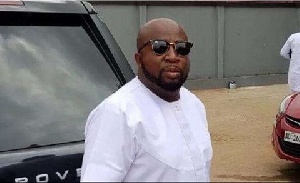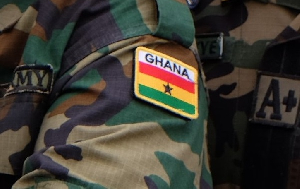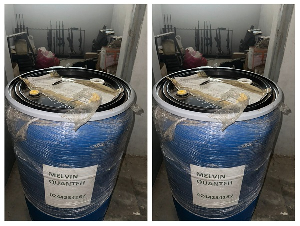The tragedy of an Akan paramount, how politics has divided the two royal families in Wenchi- Brong Ahafo region
Tradition was at display when on June 25th 2013 Professor Albert Owusu Sarpong swore
allegiance to the people of Wenchi as
their new Omanhene under the stool name Nana Anye Amanpong Tabrako II. Amid the
display of rich Akan culture and tradition one notable exception was the
absence of members of Sofoase Yefre royal family.
This is the question I put to
the Akyeamehene of Wenchi traditional area Nana Dr. Damoah Koasane Adisi-Poku
Fakobaye IV when I sat down with him on his return from Ghana following the
installation of the new Omanhene.
After listening
through this painful narrative of the tragedy of two families, I tiered up and
completely agreed with him when he advised families going through such crisis to
avoid using the court system to settle their differences however possible.
These were two royal families have at various times lived under one roof, they loved
and adored each other greatly. Ask Nana Darkoaa Dr. Kofi Abrefa Busia’s aunt
who raised him and the rest of his siblings and she remembers Nana Kwame Attakora
the son of her
cousin Nana Aduofua of Ahenfi Yefri as the one who protected her children from
bullies of Wenchi Township in their youth.
The giant looking Kwame Attakora
will stop by his aunt’s house everyday to check on his cousins oftentimes
electing to pound fufu on their behalf so that his smallish looking Busia siblings
will not suffer blisters on their palms. Those of us who grew up around their
children saw the special bound and love that existed between these families.
Even at the height of their bitter family feud, children from Ahenfi Yefre
would sneak out at night to study and party with their Sofoase Yefre cousins. I
cannot recount the many blackmail gifts and favors I took from my cousin Mr.
Kwame Attakora Gyan for not to tell on him that he was at Busia quarters
partying the night out with Mr. Spencer Kwaku Kusi Appiah and his other siblings.
Nana Kusi Appiah’s children were frequent visitors at Attakora compound and never
felt themselves as strangers nor unwelcomed at any time. You should have seen Mr.
Obeng Gyan Busia and Mr. Kwadwo Wiafe Akenteng Busia the sons of Nana Kusi
Appiah engaging in a healthy conversation with Nana Kwame Attakora and you will
not believe that only a day after that encounter, Attakora and their father
will be snaring at each other at the court.
The partnership between the
children of Ahenfi Yefri and Sofoase Yefri that sometimes bordered on sheer competition
for academic excellence is the reason why Wenchi has such a high number of
scholars for a town of its size in Ghana. So how did two families who seemed to
care for each other deeply fall off out so tragically and drag the development
of a whole town with it. POLITICS.
Education is
the key that opens the door to opportunities in life and fortunately the
British brought it to us in Ghana. But they also brought us competitive political
party system of governance for our young democracy. If you think the present political
bickering between NPP and NDC is tearing Ghana apart, wait until you talk to
people who lived through the CPP and UP era.
Nana Abrefa Mbore Bediatour IV was
a man with a great sense of humor, one of the many jokes he made about himself
when asked why he did not go to school was his first day in the classroom that
turned out to be the last time of any formal education for him.
Young Anthony Kofi
Adomako (Nana Abrefa Mbore Bediatour IV) was enrolled to start school the same
day as Dr. Kofi Abrefa Busia. The two cousins sat next to each other in the
classroom on their first day at school but before the teacher could finish
introducing himself to the class, there was a palace linguists standing at the
door, to excuse Kofi Adomakoh for the day.
An important traditional ceremony
was about to commence and his uncle the chief insists that he should be present
to witness it. That will be the last time of any formal education for this
future chief of Wenchi. Even at such an early age, Nana Kofi Adomako was being
groomed to become the chief of Wenchi one day.
But his cousin Kofi Abrefa Busia
stayed on and returned day after day to receive academic instructions from his
teachers. This man from Sofoase Yefri rose
from a humble background to achieve such academic laurels that would be the talk
of legends;
The first person of African descent to study at Oxford University;
The first African to be conferred with a professorship at that citadel of
academic excellence in Ghana; Legon. Dr. Kofi Abrefa Busia became one of the
only two Africans to be appointed to the British Colonial Service as District
Commissioner a position reserved for a person with a white skin at the time.
When Dr. Kofi Abrefa
returned from studies in Oxford, his family and the small little town of Wenchi
were ecstatic for this illustrious son who has put Wenchi on the map of Ghana.
His achievement was not lost to his cousins from Ahenfi Yefri who together with
the whole town began to wonder how they could honor this extraordinary
achievement from one of their own.
How about being conferred the chief of
Wenchi, after all he was a royal. But there was a catch; Wenchi had a
substantive chief in the person of Nana Kwame Abrefa (a.k.a Nana Kwame Yoguo)
of Ahenfi Yefri.
But such was the love that Ahenfi Yefri had for their cousin
that they were willing to support the ouster of their uncle for Busia to be
crowned the chief of Wenchi.
And that is what they did, in 1949 Nana Kwame Abrefa
was asked to abdicate his thrown and the stool was offered to Dr. Kofi Abrefa
Busia. Dr. Kofi Abrefa Busia accepted the offer but he had other interest
lurking in mind that will not let him assume the position as the chief of
Wenchi.
For Dr. Kofi Abrefa Busia had a burning desire to run for national
political office therefore accepting to become a traditional ruler did not either
appeal to him or it could as well be unconstitutional. He therefore offered the
stool to his younger brother Nana Kwame Kusi Appiah. “Tofiakwa” come again thundered
Ahenfi Yefri, give us back our stool they demanded.
Nana Kwame Kusi Appiah was
a royal alright but not in the circumstance where they have destooled their own
uncle will Ahenfi Yefri elders sign off on a Nana Kwame Kusi Appiah nomination.
But that was too late for preparation was well underway to present Nana Kwame
Kusi Appiah before Otumfuo Prempeh I to swear allegiance before the Golden
Stool as was the custom during the period of Ashanti Confederacy when the
Ashanti monarchy held Bono as her vassal state.
Seething with rage and betrayal,
Ahenfi Yefri family will boycott the installation of Nana Kwame Kusi Appiah.
They baited their time for the opportunity to destool him and take back their
stool.
Dr. Kofi Abrefa Busia went into
national politics alright but in the political contest between his UP and CPP,
it was the latter that gained ascendency to usher Ghana into independence. Dr.
Kofi Abrefa Busia will have to contend with being the leader of opposition party
in parliament.
The immediate period preceding independence and the decade after
that was particularly perilous in Ghana’s history. The contest between CPP and
UP was literally a fight between perceived real enemy combatants.
A traumatized
nation could only watch on in dismay as CPP supporters were being chased out of
communities where UP had majority.
Dr. Kwame Nkrumah himself survived numerous assassination
attempts on his life. In response he unleashed his attack dogs “the valender
Boys” against his enemies. Legislation was enacted to stifle opposition, Dr. JB
Dankwah was thrown in jail, Dr. Kofi Abrefa Busia fled into exile. Ghana will
eventually be declared a one party state.
The persecution against his political
enemies got even more intense, chiefs who were perceived to be supporters of UP
risk destoolment. With his brother out of the country and CPP government firmly
in control, Nana Kusi Appiah’s detractors descended on him. Destoolment charges
were brought against him and in 1958 he was destooled.
Fearing for his life and
the possibility of political persecution, he fled into exile with his family to
Lagos Nigeria. A son born while in exile still bears his famous Nigerian
childhood nickname Mr. Olu Bame Busia. That same year, Nana Kofi Adomako was
installed as the new chief of Wenchi under the stool name Nana Abrefa Mbore IV.
The new chief quickly found himself embroiled in the heated Bono political
struggle of the time. A group of Bono chiefs led by Techiman, Dormaa, Kukuom
Abase and Domase have started agitations to break the Ashanti monarch’s stranglehold
and or hegemony over Bono lands by advocating for secession from Ashanti
Confederacy.
These chiefs became his protégés as he fully embraced their
struggle. Nana Abrefa Mbore Bediatour IV will become the first Bono chief to openly
defy the tradition of swearing the oath of office before Asantehene. All the
aforementioned chiefs had strong CPP credentials and the new Wenchi chief became
their faithful disciple, he led his Ahenfi Yefri royal family to become staunch
supporters of Convention Peoples Party.
And with that, the destiny of these two
families swung precipitously to the opposite ends of Ghana’s political divide;
Busia and his Sofose Yefri became UP members while Abrefa Mbore Bediatuo IV and
Ahenfi Yefri went for CPP.
But Dr. Kwame Nkrumah’s government will not rule
for ever, on 24th February 1966 while on his way to bring peace to
the warring factions in Vietnam, the peace that he has denied his own citizens
will become his Waterloo. A group of soldiers led by General E. A. Kotoka besieged
his flagstaff house residence and overthrew his CPP government.
The new
military junta set out to pacify the nation of the excesses of Nkrumah’s rule.
Chiefs who were thought to have been destooled because of their affiliation
with UP party were asked to come and reclaim their stool. With the NLC Decree
112, Nana Abrefa Mbore Bediatuo IV was destooled and Nana Kwame Kusi Appiah
became the chief of Wenchi for the second time. Dr Kofi Abrefa Busia returned
from exile to win the first post Nkrumah era election and became the Prime
Minister of Ghana in 1969.
For a time, the position of Nana Kusi Appiah as the chief
seemed unassailable but that was not for long. In 1972 Colonel Kuti Acheampong
the man who led the security detail of Prime Minster Dr. Kofi Abrefa Busia
overthrew his government three years into his administration.
When Colonel
Acheampong proclaimed himself the Head of State and commissioner of Chieftaincy
affairs, Nana Abrefa Mbore Bediatuo IV reemerged and appealed to the government
to restore him back to his stool. Colonel Acheampong tasked the National House
of Chiefs to work with the chief state Attorney Mr. A. E. A Aikins to establish
the true claimants of Wenchi stool.
Thus began an excruciating process of
probing the genealogy of the families, something that no one should wish even
on their worst enemy. By the end of the trial, every myth that the two families
have held about their blood relation over a millennium was broken
. Ahenfi Yefri
and Sofoase Yefri will not see themselves as blood cousins again. The courts finally
ruled that Ahenfi Yefri was the true legitimate claimants of the Wenchi Stool.
A government issued white paper will permanently exclude Sofoase Yefri as
royals in Wenchi.
The biggest victims of the bitter family feud were the
hapless people of Wenchi who were left with the psychological trauma of divided
loyalty. Nana Abrefa Mbore Bediatuo IV was reinstated in 1975 and continued his
rule over a very divided town. He died in 2004. Nine years after the death of
Nana Bediatuo IV, the Queenmother has nominated Professor Albert Owusu Sarpong
as the next Omanhene of Wenchi.
The people of Wenchi will want nothing from the
new Chief than to bring peace and reconciliation between their feuding families.
The two families have lived with this pain of separation for far too long, the
time has come to bring an end this sad chapter of Wenchi history. For all the
public show of antipathy toward each other, those of us who lived in Nana Kwame
Attakora’s compound for example rather saw a very tormented old man.
The fact
that as the patriarch of Ahenfi Yefri he has presided over the estrangement of
Ahenfi Yefri and Sofoase Yefri troubled the old man greatly. He would be heard
murmuring to himself “I will bring our families together before I die”.
When
Dr. Kofi Abrefa body was brought to Wenchi in 1978 for burial, Nana Abrafe
Mbore Bediatuo IV then chief of Wenchi was prevented from attending the funeral
but you should have seen a distraught chief at his palace. I was at his palace
and saw Nana Abrefa Mbore Bediatuo cry like a baby over the death of his
cousin, he had to be whisked away to his private quarters because chiefs are
not supposed to cry in public.
Mr. Nelson Mandela in one of his famous quotes
about love said “No one is born hating another person, people must learn to
hate….” Unfortunately for Ahenfi Yefri and Sofoase Yefri families, they dragged
themselves before the courts and were aptly thought how to hate each another.
Looking
back at what the families have gone through over five decades, this is the time
for somber reflection to give peace a chance. For the sake of this beautiful
city on the hill and in the words of Rodney King “can we all get along”. As
painful as it was, we may
not be able to change the past, but we sure can at least change our attitude
toward it.
Thomas Kofi Kyeremeh
Germantown Maryland,
USA
Kofipat25@gmail.com












